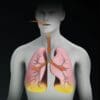The Silent Saboteur: How Smoking Worsens Lung Health in Bronchopneumonia Patients and a Path to Recovery**
Introduction
Smoking is a notorious health hazard, known for its detrimental effects on lung health. For individuals suffering from bronchopneumonia, the stakes are even higher. Bronchopneumonia, a type of pneumonia that affects patches throughout both lungs, can be exacerbated significantly by the presence of tobacco smoke. This article delves into the ways smoking impacts lung health in individuals with bronchopneumonia, offering insights into the complexity of this health challenge and guiding readers towards healthier living.
Section 1: Understanding Bronchopneumonia and Smoking
Bronchopneumonia is an inflammatory condition of the lungs characterized by the presence of infection in the bronchioles. Symptoms can include coughing, difficulty breathing, chest pain, and fever. When combined with smoking, these symptoms can intensify, leading to serious complications. Smoking introduces a myriad of harmful chemicals into the lungs, such as tar, nicotine, and carbon monoxide, which can impair the lungs’ ability to fight infection and repair damage.
Section 2: Negative Effects of Smoking on Lung Health
1. Reduced Ciliary Function: The cilia are small hair-like structures in the lungs responsible for clearing mucus and pathogens. Smoking paralyzes or destroys these cilia, making it harder for the lungs to clear out infections associated with bronchopneumonia.
2. Increased Mucus Production: Smoking stimulates the production of mucus while concurrently reducing the ability to expel it, leading to clogged airways and increased difficulty in breathing.
3. Inflammation and Damage: The chemicals in tobacco smoke cause inflammation and structural damage to the airways and lung tissues, exacerbating the symptoms of bronchopneumonia.
4. Immune System Suppression: Smoking weakens the immune system, reducing the body’s ability to fight infections, thus prolonging the recovery process from bronchopneumonia.
Section 3: The Ripple Effect on Health and Lifestyle
Individuals with bronchopneumonia who smoke are more likely to experience prolonged hospital stays, recurrent infections, and a general decline in overall health. Complications can escalate, leading to chronic obstructive pulmonary disease (COPD) or even lung cancer in the long run. This emphasizes the need for smokers to reconsider their habits, especially when dealing with respiratory illnesses like bronchopneumonia.
Section 4: The Path to Recovery – Embracing a Healthier Lifestyle
For those ready to embark on a journey to improved health, quitting smoking is a crucial first step. This transition not only aids in the recovery from bronchopneumonia but also enhances overall lung health and quality of life.
Section 5: Introducing Fitpaa – Your Companion in Health
Fitpaa is committed to helping individuals overcome health challenges and achieve optimal wellness. Through its state-of-the-art AI-driven metabolism monitoring and management technology, Fitpaa provides personalized health plans designed to support lifestyle changes, including smoking cessation. The Fitpaa Capsule combines medical therapy, nutrition guidance, and fitness plans tailored to your unique needs, ensuring a holistic approach to achieving your health and fitness goals.
Conclusion
Quitting smoking is a challenging yet rewarding endeavor, particularly for those battling bronchopneumonia. With the right support and resources, such as those offered by Fitpaa, individuals can not only combat the immediate effects of smoking on lung health but also pave the way for a healthier future. Download the Fitpaa app today and take the first step towards a smoke-free, healthier life designed to breathe easier and live better.









